- Home
- Alice Hoffman
Angel Landing Page 3
Angel Landing Read online
Page 3
“Satisfied?” I asked Lark.
Lark shook her head as she walked to the door. “I won’t be satisfied until I see you at EMOTE. Maybe then you’ll learn something about social work. Maybe then you’ll learn something about success,” she said as she walked out the door.
Each time I compared my feelings about work with Carter’s I grew depressed. He was dedicated to a job nobody paid him for, nobody wanted him to do, yet he was happier than if he had sat on the board of directors of his father’s cereal company. But now when I thought about Carter I wondered if I might also have a chance for the same sort of fulfillment. If I became immersed in work, if I followed Lark’s lead, I might start to sing in the shower, I could find joy in social work, reasons for dedication. If Carter had not been a man who thought of his work not as a job but as a passion, and if Lark had not needled me and forced a second wind of hope into my sagging professionalism, I might have spent that day like any other. I would have studied the naked blackberry canes in the frozen ground outside my window, I would have thought about writing my letter of resignation to Outreach’s board of directors, I might even have imagined a move to California or the Southwest. But it was not like any other day, and so I got Michael Finn.
When Emily buzzed me and announced that a new client had just walked through the door, I thought it would be a small-time thief or a junkie, perhaps the court had sent over a fisherman arrested in a local bar or an abusive mother forced into therapy by the law. I never thought, as I opened the door and reached for the case file Emily handed me, that it would be anyone special. When I went back to my desk Michael Finn stood by the open door, hesitating. His long hair fell over the collar of his leather jacket. He leaned on the door and looked in at me.
“Why don’t you sit down?” I said, pointing to the chair on the other side of the desk.
“No thanks,” Finn said, but he did come into the office then; he closed the door behind him.
The only facts Emily had written into the file were his name, his address, and his age—twenty-nine. I looked over the top of the manila folder. “You haven’t been referred by the court?” He would be my only client not forced into therapy, not ordered to produce his psyche at a given hour, legally bound to bare his soul twice a week.
“That doesn’t mean I want to be here,” Finn told me.
His eyes were the kind that could electrify with just one look.
“Why don’t you have a seat?” I suggested. “We’ll never be able to talk this way.”
Finn shrugged and sat down. He stretched out his legs and crossed them, obviously waiting for me to make the first move.
“Cigarette?” I offered the pack on my desk. I, kept it there for new clients under stress, though sometimes I, too, needed to smoke.
“No.”
“Why did you decide to come to Outreach? You must have had a reason.”
“I didn’t know where else to go,” he said.
“I hope I can help you,” I said reassuringly.
“I doubt that,” Finn said as he took a pack of cigarettes from his pocket. He lit a match, inhaled. “I don’t think anyone can help me.”
“If you really thought that, you wouldn’t be here,” I smiled.
“I am here, aren’t I?” Finn agreed.
“Let’s start,” I suggested, but neither of us spoke. A thin scar ran across Finn’s cheek, from his left eye to his ear; his wrists were knotted with long, blue veins. “Why have you decided to come for therapy?”
“I have to talk,” Finn said simply.
“All right,” I nodded. “Good,” I said. “About what?”
Finn looked at me carefully. “I’m the bomber,” he said.
I had been scribbling notes in Finn’s file—“anxious,” I had written, “extremely ill at ease.” Now I looked up and met his eyes. “What?” I said. “What was that?”
“The power plant,” he said. “I’m the bomber.”
I put down his file and reached for one of my cigarettes. Carter had always warned me against the danger of nicotine, and it now seemed my breath was terribly irregular.
“Actually,” Finn continued, “it wasn’t a bomb. It was a valve I reworked, and when it blew the gas tanks caught fire. But in court they’ll call it a bomb, so I might as well do the same.”
“Court?” I said.
“Eventually they’ll figure it out,” Finn said. “I’ve already been taken to the police station for questioning.”
“Just a minute,” I said. “Wait one minute.” Michael Finn looked nothing like the bomber I had imagined. That bomber was taller, he walked with a limp, he carried a briefcase full of dynamite, and he wore black gloves. “Exactly how did you gain access to this valve?”
“I work at the power plant,” Finn explained. “I’m a welder.”
I shook my head. “I’m sorry. I find your whole story difficult to believe.”
Finn brightened, he very nearly smiled. “Really?”
Perhaps he was one of those desperate characters who felt the need to confess to crimes they never committed. He would then be a client with a string of interesting pathologies, a borderline psychotic, a case of intrigue and neurosis.
“So you’re the bomber?” I said. “And you say you’ve already gone to the police?”
Finn smiled briefly. “The police came to me.”
“I see,” I said. “They knew right away to come to you.”
“I think they plan to question every power plant worker, they just happened to bring me in with the first bunch of workers. But it’s only a matter of time before they figure out it was me. Every welder stamps the work he does with his initials. As soon as they find the pipes I welded, they’ll know.”
He sounded quite rational; truth was a vague possibility. “Have you gone to your family? Have you told them what you did?”
“My family?” Finn said. “They don’t want to know. They think the worst without being told anything at all.”
“You can’t be sure of that until you tell them,” I said.
“I can’t be?” Finn said mockingly. “Yes I can. I certainly can. The police came to pick me up for questioning at my parents’ house. My folks were ready to guess I was wanted for murder, manslaughter at the very least.”
“Murder?” I said warily. “What’s this about murder?”
Finn ignored my question. “Listen,” he said. “Every thing I say here is confidential, right?”
“That’s right.”
“You can’t repeat anything I tell you?”
“Morally and legally, I’m bound to keep every word confidential,” I said, but I was beginning to feel cornered, I wasn’t so certain I wanted the information Michael Finn might offer. Of course, in the same situation, Lark would have jumped, she would have shivered at the prospect of an interesting case, she would have delighted in stories of passion and crime. “All right,” I said, “why don’t you tell me more about yourself.”
“What should I say?” Finn asked.
“Whatever comes to mind.”
Finn looked around the room cautiously. His hair was the color of lions; his eyes narrowed with suspicion. He leaned forward conspiratorially.
“I can’t talk about myself,” he whispered. “Not here. Your office could be bugged.”
“Who would want to bug my office?” I laughed, though I had sometimes wondered if Claude Wilder’s desire for total power at Outreach would lead him to electronic devices and wiretapping.
“The government?” Finn guessed.
“Do you sometimes feel that you’re being followed?” I asked.
Finn scowled. “Of course not. I’m not paranoid.”
I wanted to keep him talking, I wanted to get to his dreams and delusions; I wondered if there might actually be enough material in his case for a journal article, perhaps the first chapter of a book.
“So you insist that you’re the bomber?” I asked.
“Did I say that?” Finn said.
“You certainly did,” I nodded.
“If I did have anything to do with the explosion I wasn’t in my right mind,” Finn said. “I could have been temporarily insane. Of course that doesn’t mean I’m saying I did it.” Finn paused. “I’m not saying anything at all.”
I wanted to gain his trust. “Look,” I said finally, “I didn’t ask you to come here, you decided that on your own. Now you say you don’t want to talk.”
“Not here,” Finn agreed. “I can’t talk here.”
“No one is comfortable at the very beginning of therapy,” I said. When Finn didn’t answer I tried another tactic. “Maybe you don’t really want to start therapy at all.”
Finn studied me carefully. “Meet me tonight,” he suddenly said.
“Are you kidding?” I said. He had caught me off guard; my hand shook as I reached for my appointment book. “I can see you, starting next week, every Tuesday and Thursday. Sometime in the afternoon?”
“Tonight,” Finn said. “If you really want to talk, if you want to know what happened, you’ll meet me tonight.”
“If you’re the bomber, if you’re really serious, you’ll tell me what happened right now. Right this minute” I challenged. But Finn smiled and shook his head no. “Why should I believe you?” I asked. “Why should I meet you?”
Michael Finn stood. “At the high school,” he said as he reached over and crushed his cigarette out in the ashtray on my desk. “Behind the bleachers at eight o’clock,” he told me as he walked to the door.
“It’s out of the question,” I said.
Finn shrugged and opened the door into the waiting room. “I’ll be there,” he said before he walked out of my office, “even if you’re not.”
“Wait a minute,” I called, but he kept right on walki
ng. I went to the door, Finn was on the far side of the waiting room, he had already opened the door. “What about Tuesday?” I cried.
He left the door open behind him; leaves and sand drifted over the floor. At her desk, Emily was deeply engrossed in a paperback novel; a client, a young girl, waited on the couch until the time for her appointment with Lark. My voice still echoed, calling Finn back, but neither Emily nor the girl bothered to look up at me. Neither had even looked up as Finn walked across the room; it was possible that I had imagined him, perhaps nothing had crossed the linoleum in those few minutes but a few faded birch leaves, sand the color of pearls.
I went back into my office and closed the door. Finn had disappeared as suddenly as he had come. In his file were white sheets of paper, clean, hungry for facts. If he was telling the truth, if he was a man with no loyalties, a stranger with smoke on his hands, he might very well soon be quite famous. If he were to be my client I might be interviewed during the course of his trial; the New York Times would contact me, Newsweek would telephone, the Fishers Cove Herald might ask for a daily psychology column.
In the chair where Finn had sat, the impression of his body remained; the odor of his brand of tobacco clung to my clothes. Even hours later, when other clients sat in the chair, Finn still seemed to be there, no one erased the lines he had left behind.
Later, between appointments with the anorectic, who refused to eat anything more than grapefruit, and an elderly shoplifter who could not ignore the urging of vague demonic voices whenever she set foot in a department store, I called Carter to cancel our Wednesday night together.
“It’s not that I don’t want to see you,” I explained, “I just have too much work.”
“I understand perfectly,” Carter said. “I don’t have time to breathe. A busload of demonstrators is coming out from Manhattan tomorrow. We’re going to storm the power plant at midday. I wish you could be there with me.”
“Too much work here at Outreach,” I said. “Much too much.”
Tonight, while Carter arranged a protest at the power plant, I might be meeting with the bomber himself. I would hear information so privileged no one else could be told; I would be as close to the truth as an accomplice. If Finn was indeed the bomber. If he was not merely trapped by delusions, a man who wanted to confess but did not yet have a crime. Perhaps he was only planning a crime: a murder behind deserted bleachers, a rape in the football field, an assault, a disappearance.
“Maybe we should meet tonight,” I now said to Carter. “I can come over to your place. We could make dinner together. We could make love.”
“Do you want to know what I think?” Carter said, “I think the best thing you can possibly do right now is dig into your work.”
“Really?” I said.
“Really. Then you might better understand why I’m so wrapped up with Soft Skies. You might even decide to be a part of the series of demonstrations I have planned for next summer.”
“I didn’t know you were already thinking about summer,” I said, more hurt than interested.
“I have to make plans if we don’t want any more plants like Angel Landing Three,” he said.
“Oh Carter,” I said, annoyed. “You can’t stop an entire industry single-handed.”
“I know that,” Carter said. “Hey, I know.”
“Where do you plan to be?” I now asked. “Next summer.”
“I want you to go with me,” Carter said.
“Where?” I asked.
“I’m not certain. I’ll be here until Angel is closed down, and then who knows? California, Oregon, wherever I’m needed.”
“I see.”
“I want you to go with me,” Carter said.
“And just quit my job?” I asked.
“I have enough money for both of us. Two can live as cheaply as one.”
“I see, you want me to dig into my job and then quit it.”
“I love you,” Carter said suddenly. He sounded so far away, so sad.
“Really?”
“I’ll miss you tonight,” Carter said. “I always do.”
“Is that true?” I asked, but he had already hung up. By the end of the day I had made up my mind. I would leave Outreach and stop at the Mercy Home; Minnie would be finished calling out Bingo numbers, she would have read her last story in faulty Russian to an old woman who longed for lumps of sugar in her tea and the language she had nearly forgotten. As Minnie and I walked home together, there would be no reason to wonder if what I planned to do was right or wrong, because I had decided before I left work that day, before I locked the office door behind me: I would do what Finn asked; I was ready to meet him.
THREE
THE MERCY HOME HAD once been a bordello. In the early nineteen hundreds, when Fishers Cove was a whaling town, sailors who planned to stay in port for a week often did not leave for months. Sometimes, after meeting a particularly beautiful woman, they did not leave at all; instead they opened taverns and grocery stores and shoe repair shops, and even though they listened to the sea, they no longer really heard it; they had begun to see the outline of Connecticut across the harbor much more clearly than they could see the waves.
Now, very little of the house’s past was left, except for the blue Victorian turrets. It had been gutted; stained-glass windows were shuttered behind iron bars; where there had once been a redwood dining table, a reception booth staffed by nurses now stood. In the dayroom, which had once been a parlor filled with velvet and flesh, a television set blasted to a line of captive viewers, an audience strapped into wheelchairs, too exhausted to move out of the line of the newscasts and the game shows. Just behind the double glass doors which had replaced carved oak, Minnie was waiting for me.
“Over here,” Minnie signaled with a wave of her hand. “Here.”
The nursing home had once been painted in bright, cheery colors, but that paint had faded years ago, and beneath sharp fluorescent bulbs the whole place looked dismal.
“Are you deaf?” Minnie whispered from the doorway. “Over here.”
“What are you doing?” I asked. When Minnie raised an annoyed finger to her lips, I dropped my voice to a whisper. “I thought we would walk home together,” I said.
“There’s something I want you to see,” Minnie told me.
“Tonight’s my night with Carter,” I reminded my aunt, though it wasn’t at all our night any longer, not since Finn.
“Don’t worry about that,” Minnie said. “This will take a minute.”
I agreed to follow Minnie into the dayroom. Inside was a row of elderly residents, most of them women. Though they faced the TV, none of them actually watched the screen; instead their milky eyes were directed at the wall.
Minnie crossed her arms angrily. “So now you see,” she said to me. “Is this the way to treat senior citizens?” She shook her head sadly. “Very nice.” Minnie turned to make certain no nurses approached us, then she poked me with her elbow, she lowered her voice below a whisper. “Their stockings,” she croaked.
“What?” I leaned my ear closer to my aunt.
“Stockings,” Minnie whispered. “That’s what I wanted you to see.”
Nearly every one of the old women’s stockings had fallen; there were folds bunched around their knees, drooping nylon gathered around their blue ankles.
“Don’t they wear garter belts?” I asked.
“Garter belts?” Minnie laughed. “These old ladies don’t remember their names, how can they remember garter belts?”
“They must be freezing,” I said. “Somebody should do something about it.”
“Hah,” Minnie said gloomily as she signaled me away from the dayroom.
“Why do you have your coat on?” a nurse behind the reception booth called to Minnie as we prepared to leave.
Minnie stroked her camel’s hair coat. “I’m Mrs. Lansky,” she said.
“How nice for you,” the nurse said as she approached Minnie.
“She’s a volunteer here,” I explained. “My aunt.”
“A woman her age?” the nurse said.
“That’s right,” Minnie said. “A woman her age.”
“My shift starts at five-thirty,” the nurse explained to me. “I can’t be expected to know all the day volunteers. Especially not by name. Isn’t that right, Mrs. Lansky?” the nurse said sweetly to Minnie.
But sweetness was no use on Minnie now; she refused to answer the nurse; she growled low down in her throat.

 The Story Sisters
The Story Sisters Local Girls
Local Girls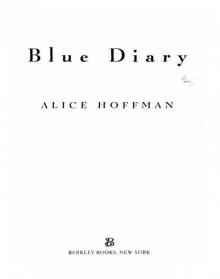 Blue Diary
Blue Diary The River King
The River King Here on Earth
Here on Earth Illumination Night: A Novel
Illumination Night: A Novel The Marriage of Opposites
The Marriage of Opposites Nightbird
Nightbird Incantation
Incantation Skylight Confessions
Skylight Confessions The Ice Queen
The Ice Queen Second Nature
Second Nature Fortune's Daughter: A Novel
Fortune's Daughter: A Novel Seventh Heaven
Seventh Heaven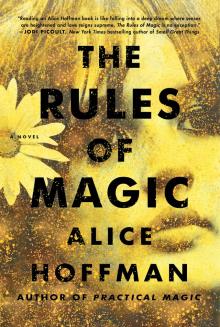 The Rules of Magic
The Rules of Magic The Red Garden
The Red Garden The Third Angel
The Third Angel White Horses
White Horses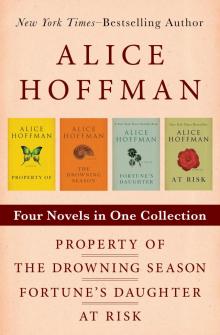 Property of / the Drowning Season / Fortune's Daughter / at Risk
Property of / the Drowning Season / Fortune's Daughter / at Risk Angel Landing
Angel Landing Magic Lessons
Magic Lessons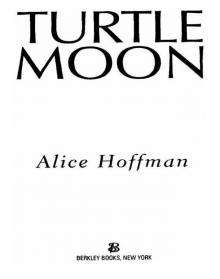 Turtle Moon
Turtle Moon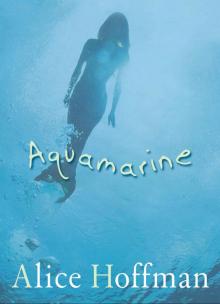 Aquamarine
Aquamarine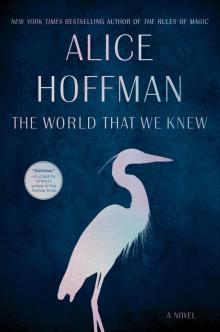 The World That We Knew
The World That We Knew Faithful
Faithful The Dovekeepers
The Dovekeepers The Foretelling
The Foretelling Green Angel
Green Angel At Risk
At Risk Green Heart
Green Heart Fortune's Daughter
Fortune's Daughter Faerie Knitting
Faerie Knitting Incantation (v5)
Incantation (v5) Green Witch
Green Witch Practical Magic
Practical Magic The Museum of Extraordinary Things
The Museum of Extraordinary Things The Probable Future
The Probable Future Illumination Night
Illumination Night The Dovekeepers: A Novel
The Dovekeepers: A Novel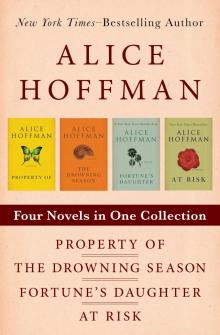 Property Of, the Drowning Season, Fortune's Daughter, and At Risk
Property Of, the Drowning Season, Fortune's Daughter, and At Risk